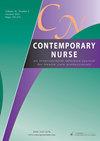covid -19对护士心理健康影响的横断面调查:职业中断、组织准备、心理伤害和道德困境
IF 2.1
4区 医学
Q3 NURSING
引用次数: 2
摘要
背景:2019冠状病毒病大流行给全球卫生保健系统和卫生保健工作者(HCWs)带来了前所未有的长期压力,护士首当其冲。目的:描述职业中断和COVID-19暴露的类型和流行程度,及其对澳大利亚护士心理健康、道德困扰、应对策略和寻求帮助行为的影响。设计:在2020年8月27日至10月23日期间在澳大利亚卫生保健工作者中进行横断面在线匿名调查。方法:收集人口统计、工作场所混乱、人际关系和心理健康方面的数据。通过多元回归分析确定心理健康影响和应对策略的预测因子。结果:共收到完整回复7845份,其中护士3082份(39.3%),其他医护人员4763份(60.7%)。职业中断很常见,护士特别报告额外的带薪工作时间(p < 0.001)。与其他医护人员相比,护士接触和感染COVID-19的频率更高(p < 0.001),并且更有可能报告对更广泛社区的污名化的担忧(p < 0.001)。精神疾病的症状(焦虑、抑郁、创伤后应激障碍和倦怠)在护士中明显比其他卫生保健工作者更普遍,尽管两组在适应能力方面得分都很高。心理健康症状的常见预测因素包括接触COVID-19和人际关系恶化。护士报告了各种应对策略,并且比其他医护人员更有可能增加酒精消费量。这两个群体对正式支持服务的参与度都很低。确定了应对策略使用的个人和专业预测因素。结论:需要采取紧急行动,解决因COVID-19而加剧的工作人员短缺和职业倦怠问题。认识到护理人员的重要性并激励当前和未来的护士加入并留在工作岗位上的举措至关重要。本文章由计算机程序翻译,如有差异,请以英文原文为准。
Cross-sectional survey of COVID-19-related impacts on mental health of nurses: occupational disruption, organisational preparedness, psychological harm, and moral distress
Background: The COVID-19 pandemic has presented unprecedented levels of prolonged strain on healthcare systems and healthcare workers (HCWs) globally, with nurses at the forefront. Objectives: To describe types and prevalence of occupational disruptions and exposure to COVID-19, and their impacts on mental health, moral distress, coping strategies, and help-seeking behaviours of Australian nurses. Design: A cross-sectional online anonymous survey distributed amongst Australian HCWs between 27 August and 23 October 2020. Methods: Data was collected on demographics, workplace disruption, personal relationships, and mental health. Predictors of mental health impacts and coping strategies were identified through multivariate regression analyses. Results: 7845 complete responses were returned, of which 3082 (39.3%) were from nurses and 4763 (60.7%) were from all other professions (‘other HCWs’). Occupational disruption was common, with nurses specifically reporting additional paid hours (p < 0.001). Nurses were exposed to, and infected with, COVID-19 more frequently than other HCWs (p < 0.001) and were more likely to report concerns around stigmatisation from the broader community (p < 0.001). Symptoms of mental illness (anxiety, depression, PTSD and burnout) were significantly more prevalent in nurses than other HCWs, despite both groups scoring high on resilience. Common predictors of mental health symptoms included exposure to COVID-19 and worsening of personal relationships. Nurses reported a variety of coping strategies and were more likely than other HCWs to increase alcohol consumption. Engagement with formal support services was low for both groups. Personal and professional predictors for coping strategy use were identified. Conclusions: Urgent action is needed to address staff shortages and burnout which have been exacerbated by COVID-19. Initiatives that recognise the importance of nursing staff and incentivise current and future nurses to join and remain in the workforce are essential.
求助全文
通过发布文献求助,成功后即可免费获取论文全文。
去求助
来源期刊

Contemporary Nurse
医学-护理
CiteScore
2.00
自引率
6.20%
发文量
38
审稿时长
6-12 weeks
期刊介绍:
Contemporary Nurse is an international peer-reviewed journal designed to increase nursing skills, knowledge and communication, assist in professional development and to enhance educational standards by publishing stimulating, informative and useful articles on a range of issues influencing professional nursing research, teaching and practice.
Contemporary Nurse is a forum for nursing educators, researchers and professionals who require high-quality, peer-reviewed research on emerging research fronts, perspectives and protocols, community and family health, cross-cultural research, recruitment, retention, education, training and practitioner perspectives.
Contemporary Nurse publishes original research articles, reviews and discussion papers.
 求助内容:
求助内容: 应助结果提醒方式:
应助结果提醒方式:


